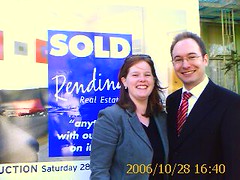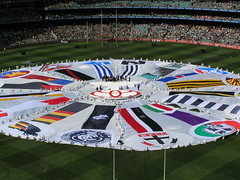There are plenty of house-buying strategies out there, but the one I used on the weekend is supported by some common sense theory, is not illegal, but most importantly can actually work: we are now house-owners! I figure I won’t be needing to use this one again soon, so I’m happy to share it with anyone else who is bidding at auction.
Firstly, there are two possible auction outcomes: either the property sells at auction, or it doesn’t. If it doesn’t, then any bids you’ve made simply provide the vendor with a position to negotiate the price up from. So, it’s better if you haven’t made any bids in that case, and you can simply begin negotiations directly when the auction finishes.
In the case it’s going to sell, the property will go on the market at some point, and the auctioneer will indicate this by saying it’s “on the market”, it “will sell”, or something like that. After this has happened, you should begin to bid.
As auctions are a painful thing, pretty much anyone prepared to bid at one will have rationally thought out what their limit is, before they go. If your limit is below anyone else’s, you aren’t going to win. However, auctions aren’t a completely rational environment.
Auctioneers are very good at putting on a show, pressuring bidders, and otherwise channelling PT Barnum. Most people have an “emotional limit” that is higher than their “rational limit”. If they used their credit cards, sold some shares, restricted their lifestyle, borrowed a bit from a mate, or did something else that they don’t really want to do, then they could go beyond their rational limit. The auctioneer’s goal is to have people bid well above their rational limit, up to their emotional limit. Even if you have the highest rational limit, you will lose the auction if anyone’s emotional limit is higher than your rational limit.
The mechanics of auction are such that the winner is the one that’s prepared to pay the most, but they only need pay as much as the loser would pay. For example, if a person who is willing to pay up to $200,000 is bidding against another who is willing to pay up to $300,000, then the latter can win by paying $200,001. So, even if your rational limit is higher than everyone’s emotional limit and you win, you will pay a price equivalent to the loser’s emotional limit.
No legal auction strategy can lower people’s rational limit, but a good auction strategy can keep people’s emotional limit to close to their rational limit. This can save you money and may even win you the auction. Unfortunately, the auctioneer is trying to do the opposite, and push the emotional limits of the bidders.
So to beat the auctioneer, you need to join them. They power dress to impress, they stand at the front like a teacher at a class, and they whoop and shout to whip up the emotions. To counter this, you need to dress as a real-estate agent in a dark suit, stand at the front near the auctioneer, and every time the bid increased by someone else, calmly but immediately increase it yourself. You should look like someone with infinite patience and a infinite limit, and who is there to buy.
I felt a little silly, standing up there alone in my suit near the auctioneer. The auctioneer knew what I was up to and started to ignore me. When someone else bid me up, he wouldn’t come back to me straight away, so I had to shout out my bids in order to regain the lead. I think we would’ve won anyway, but this strategy probably saved us a few thousand dollars.


